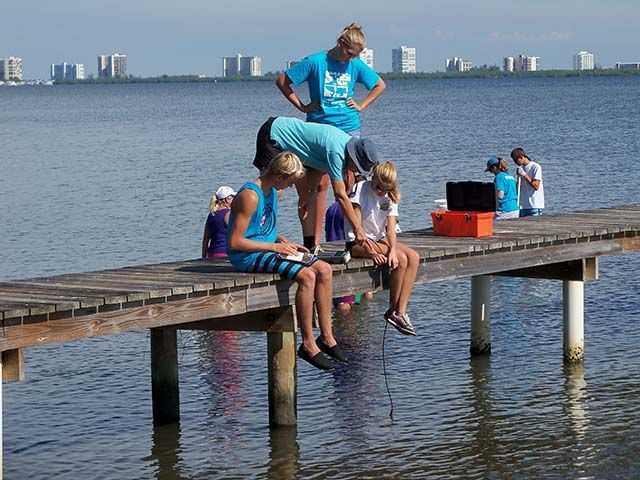
By Shannon Dack
During Earth Month, there are always wonderful quotes and phrases passed around on websites and emails. From scientists to poets to political leaders, everyone has something to say about conservation and our part to play. What does conservation entail? It is a noun that has many definitions, including “the careful utilization of a natural resource in order to prevent depletion.” Conservation” is synonymous with cherishing, guarding, safekeeping, and salvation. In short, conservation is an act of love. Baba Dioum once said, “In the end, we will conserve only what we love, we will love only what we understand, and we will understand only what we are taught.”
Th e fishing community at its core loves fish. Why else would anyone sit for hours in the sun, sweating, and casting again and again…and again…to catch that elusive ‘of size’ snook, or travel off shore for hours to haul in a beautiful dorado. Lifelong fisherman Lee Wulff believed “the finest gift you can give to any fisherman is to put a good fish back, and who knows if the fish that you caught isn’t someone else’s gift to you?” When the waters are being polluted, you notice and your voices are raised. When the fish are showing signs of illness, you notice and your observations are recorded. Fishermen and women are often the first pairs of eyes that witness changes to our surroundings.
Conservation needs champions. Like the knights of medieval times, there are people shouting to make a difference. Heroes manifest in all shapes and sizes. Theodore Roosevelt, our 26th president, enjoyed big game hunting and the calm of nature. He outlawed the use of feathers in clothing as New York’s governor before preserving over 230 million acres during his presidency. President Roosevelt’s view that there is no question “…which compares in importance with the great central task of leaving this land even a better land for our descendants than it is for us” greatly influenced his time in office. Roosevelt’s friend, Sierra Club co-founder John Muir, greatly influenced the formation of Yosemite National Park.
Other environmentalists used their voice as a soft whisper through the pages of books. Authors Rachel Carson (Silent Spring), Henry David Thoreau (Walden), and Marjory Stoneman Douglass (The Everglades: River of Grass) used the written word as a tool to focus public attention onto the detriment of our decisions when using pesticides, how living life simply in nature can be ultimately fulfilling, and the wet, muddy land that was deemed useless is integral to the life and prosperity of Florida, respectively. Ms. Douglass viewed her involvement in environmental topics as “…an extended form of housekeeping” and that it was “a woman’s business” to be interested.
Florida Oceanographic is no stranger to conservation. Our mission as a Society revolves around stewardship (another synonym to conservation). Programs at the Coastal Center educate guests before encouraging interaction with marine life in a safe, controlled environment. Summer camps disguise learning through fun, hands-on activities including seining, crafts, and games. Special events gather other organizations and people to use the center as a launching block for their ideas. Community events encourage pride and ownership for our community’s coastal environments through oyster bagging and reef restoration.
But how can someone who does not have political ties, scientific degrees, or famous friends influence the future of our world? In the end, it all boils down to a very simple concept that a certain doctor wrote in a children’s book. “Unless someone like you cares a whole awful lot, nothing is going to get better. It’s not.”(Dr. Seuss)
Shannon Dack is an Education Specialist at the Florida Oceanographic Society Coastal Center. You can contact the Coastal Center, located in Stuart, Florida at (772) 225-0505 or visit on the web at www.floridaocean.org.